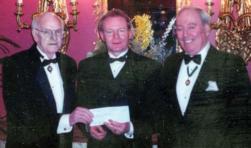March 30, 2017
 From left, Frank Burke, Martin McGuinness, and Joe Leary at the Clover Club years ago.The first time I saw Martin McGuinness was at the old Ritz Carlton Hotel in Boston in 1996 as he was striding down the second-floor corridor to join a luncheon the Irish American Partnership was holding in in his honor.
From left, Frank Burke, Martin McGuinness, and Joe Leary at the Clover Club years ago.The first time I saw Martin McGuinness was at the old Ritz Carlton Hotel in Boston in 1996 as he was striding down the second-floor corridor to join a luncheon the Irish American Partnership was holding in in his honor.
We had run a breakfast for Northern Ireland Secretary of State Mo Mowlam that morning and had invited McGuinness and Sinn Fein to address the Partnership at lunch. As I remember, the ballroom was full of hotel security watching nervously from the balcony as he began to speak after we finished our lunch.
The British Consul (we invited all sides) and several of his people were there attempting to ask discrediting questions, but McGuinness, completely at ease before the 300 or so people in front of him, handled everything quite well. Afterwards, he and I sat down for a quick chat and began a 21-year friendship that endured until he died last month. I would meet him in Belfast and Derry and whenever he came back to Boston.
The Irish American Partnership had been asked to provide encouragement whenever we could to Sinn Fein on their journey toward peace in Northern Ireland. Among those urging encouragement were Belfast’s Cardinal Cahal Daly, the Belfast Unionist Sir George Quigley, and the Irish-American philanthropist Chuck Feeney.
McGuinness was an indisputable hero to many in Northern Ireland, especially in his hometown of Derry where he was born in 1950 to a very strict Catholic family living in one of the poorer areas known as the Bogside. In many ways he never left. He was a devoted Catholic, a faithful husband and father of four children, a Pioneer (nondrinker), and anything but a model terrorist.
After witnessing many horrendous attacks upon his Catholic neighbors both in Derry and Belfast, McGuinness became a local protector of sorts and joined the Provisional Irish Republican Army. As a young man in his late teens he personally and painfully felt the result of Catholic prejudice and the divisiveness of a separated Ireland.
These were the times of indiscriminate attacks on Catholic homes and businesses, including such incidents as the Bombay Street Fires in 1969, the first Bogside riots in 1969, the Ballymurphy Massacre in1971, the Internment in 1971 when police and British soldiers arrested and imprisoned 2,000 people without charges – 95 percent of them Catholic. And, in 1972, there was Bloody Sunday.
Although he and I never talked about such things, they must have made a serious impression on young McGuinness. Hundreds of Catholics were being shot and killed every year, so for him to join the resistance was hardly unusual.
Nor was the rise of a very bright man with unusual people skills to the top of a dedicated organization unusual. One of the first to recognize McGuinness as a leader was the British government. In 1972, when he was 22, he was invited to London to discuss peace terms. At least that was the cover for the meeting. Nothing came of it, but it was only a day trip to London and the recognition did no harm.
By the early 1990s, peace talks had broken out and McGuinness devoted himself to the difficult task of bringing the more radical elements of the IRA to the peace table. Some say that control in the IRA was absolute, but anyone who knows about people management knows that is a lot of work and that not everyone was willing to give up their guns.
The Good Friday agreement was signed in 1998, and McGuinness was appointed minister of education in the North in 1999. I invited him to speak at a Clover Club dinner in Boston and over he came. It was a wonderful evening apart from a couple of loudmouths who were opposed to what McGuinness stood for. While he was here, I asked him to recommend ten schools in Northern Ireland to receive grants from the Irish American Partnership.
I then travelled to Belfast to see his assistant and ask for the list of schools. The names came a few weeks later (5 Catholic and 5 Protestant) and I delivered the grants personally, one of them to a large (900 students) school in the Penneyburn section of Derry called St. Patrick’s where the principal, Martin Coyle, also a good friend of Martin McGuinness, introduced me to a few students who were reading in their class. I was given a book to follow along. Then I heard this booming voice say, “Take that book from him; he can’t read!” It was Minister McGuinness!
Laughing and joking, we adjourned for the mandatory tea and biscuits. It was one of my best trips to Ireland.
The last time I saw Martin was in Boston at a luncheon managed by the Northern Ireland Business organization two years ago. He had come over with First Minister Peter Robinson to speak to the advantages of investing in Northern Ireland. True to his spirit, Martin came into the room, walked over, laughingly gave me a big hug and introduced me to Robinson.
I will miss this unique courageous, man.
Joe Leary retired last year after 28 years as CEO and president of the Irish American Partnership.

